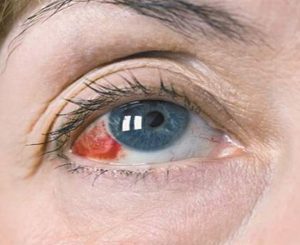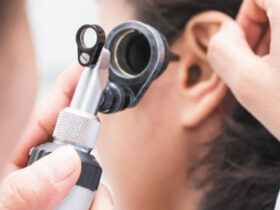Dr. Katia Taba, Board-Certified Ophthalmologist and Retinal Specialist
 Eye doctors may be able to detect signs of heart disease during a comprehensive eye exam, experts say. A new study from UC San Diego finds that people with heart disease tend to have retinas marked by evidence of eye stroke.
Eye doctors may be able to detect signs of heart disease during a comprehensive eye exam, experts say. A new study from UC San Diego finds that people with heart disease tend to have retinas marked by evidence of eye stroke.
Eye strokes happen when the eye is deprived of blood flow and oxygen, causing cells to die. This creates a mark, called a retinal ischemic perivascular lesion (RIPLs). These marks can be spotted when ophthalmologists use an imaging tool called optical coherence tomography, or OCT, to take a close look at the retina.
OCT scans of the retina (such as the one pictured above) are valuable ways to detect disease and dysfunction in all parts of the body — not just the eyes. There are new technology in those eye scans that could detect signs of Alzheimer’s, Parkinson’s and other underlying health conditions.
How eye exams can detect heart disease
The eye is the only place in the body where a doctor can see the live action of blood vessels, nerves and connecting tissue without relying on an invasive procedure. That is why eye doctors are often the first to detect health conditions including high blood pressure, high cholesterol, stroke and more. While the marks left behind by eye strokes may be present in low numbers in healthy people, those with heart disease tend to have a far greater number. Researchers at UC San Diego arrived at these results by reviewing the medical records of 84 people with known heart disease and 76 healthy people, all of whom had received a retinal OCT scan. According to the researchers, the higher number of RIPLs in the eye, the higher the risk for cardiovascular disease.
“The only place we can visualize the smallest blood vessels in the body without invasive procedure is in the eye. The retina in particular provides important evidence of the adverse effects of cardiovascular issues, such as high blood pressure,” said Anthony DeMaria, MD, cardiologist at UC San Diego Health. “It’s my hope that the presence of RIPLs in the eye will serve as a marker for cardiovascular disease when patients are undergoing assessment of risk factors for heart disease, or when patients are undergoing evaluation for the suspected presence of heart disease.” DeMaria said detection of RIPLs could result in identification of cardiovascular disease that would enable early therapy and preventative measures, and potentially reduce numbers of heart attacks or strokes.
A person’s risk for cardiovascular disease is determined by the atherosclerotic cardiovascular disease (ASCVD) risk score calculator, the national guideline developed by the American College of Cardiology. The guideline is considered the gold standard for assessing a patient’s 10-year risk of experiencing a cardiovascular event, such as heart attack or stroke. In the study, researchers found a correlation between the number of RIPLs in a patient’s eye and their ASCVD risk score.
“Globally, cardiovascular disease is the number one cause of death and unfortunately many people are unaware they may have heart issues,” said Bakhoum, MD, PhD, an ophthalmologist at UC San Diego Health. “The key in preventing this is early detection and treatment. It’s our hope that by identifying RIPLs as a marker for cardiovascular disease providers will be able to identify heart issues before a catastrophic event, such as a heart attack or a stroke, occurs.”
Catching heart disease early can save lives
“The eyes are a window into our health, and many diseases can manifest in the eye; cardiovascular disease is no exception”.
This new study adds to the list of health conditions an eye exam may help detect.
“Your ophthalmologist may be able to take an image of your eye to help find cardiovascular disease earlier than before.” For people with heart disease — the number one cause of death worldwide — early diagnosis and treatment could help stave off a heart attack or stroke.
Personalized Retina Care of Naples
If you are experiencing any changes in your eye health, whether it is blurry vision, pain, impaired vision, or any other visual irregularities, you should see an ophthalmologist right away. The earlier a disease is detected, the better the outcome and treatment options are for you. You will find a friendly and warm environment at Personalized Retina Care of Naples.
Please call (239) 325-3970 today to schedule your eye exam. When necessary same day appointments can often be accommodated.
Personalized Retina Care of Naples provides comprehensive diagnosis and treatment for retinal disorders. Dr. Taba also gives second opinions on retinal and general eye conditions. Dr. Taba is a Board-Certified Ophthalmologist and is Fellowship trained in surgical and medical retinal diseases.
Personalized Retina Care of Naples
www.retinanaples.com | 239-325-3970
3467 Pine Ridge Rd., Suite 103, Naples 34109
Source:
https://www.aao.org/eye-health/news/eye-stroke-heart-disease-vision-exam-retina-oct










